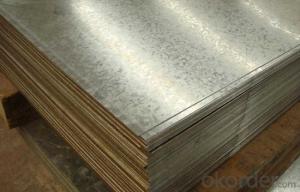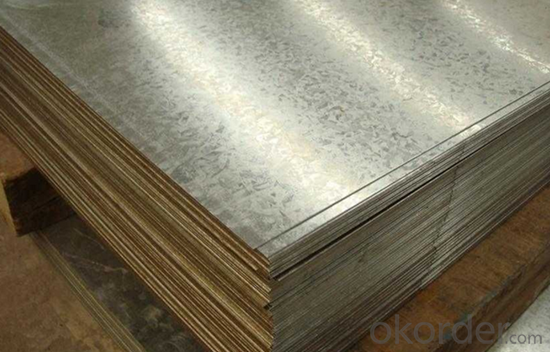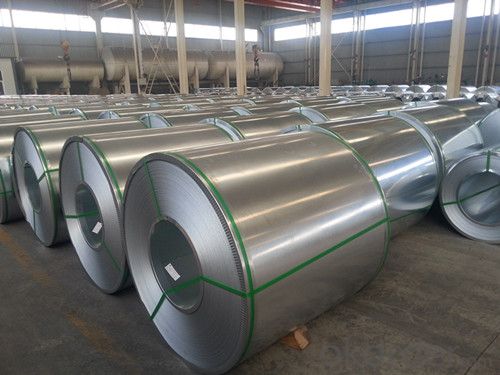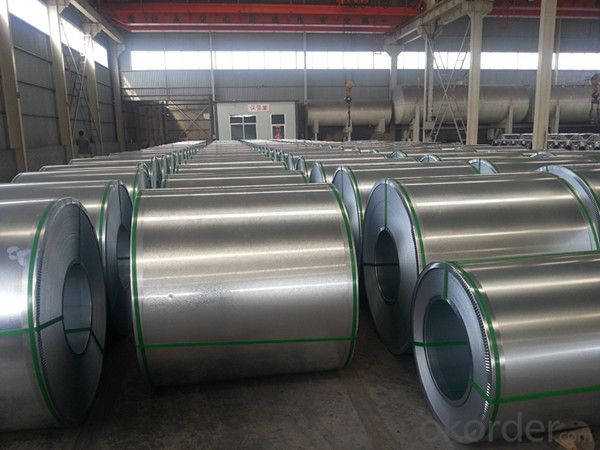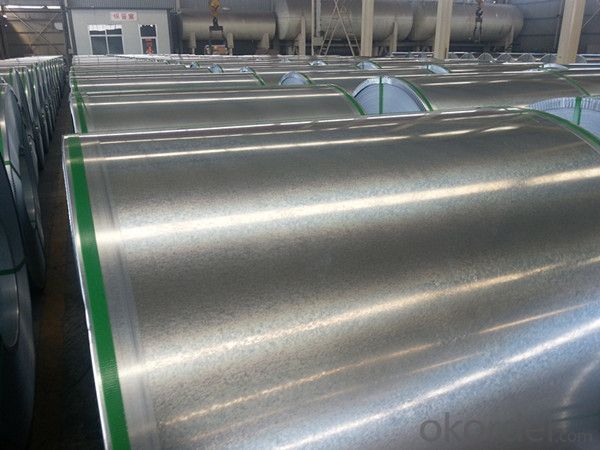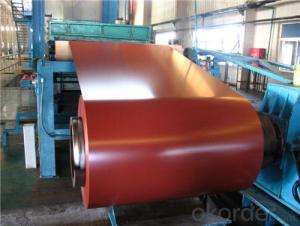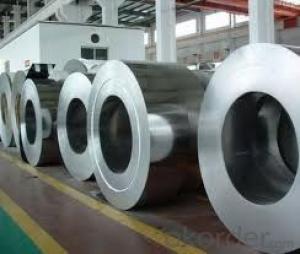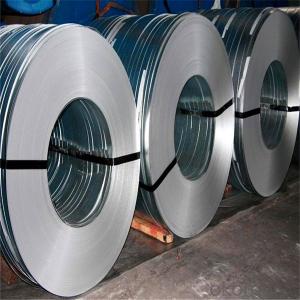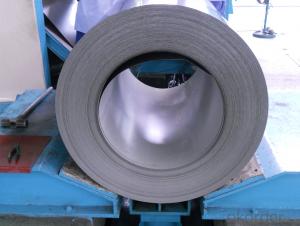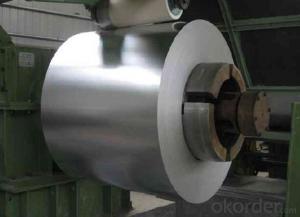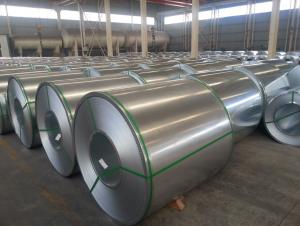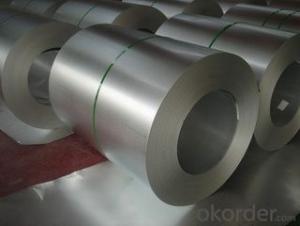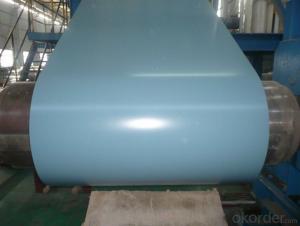Hot Dipped Galvanized Steel Coils from China
- Loading Port:
- China main port
- Payment Terms:
- TT OR LC
- Min Order Qty:
- 25 m.t.
- Supply Capability:
- 100000 m.t./month
OKorder Service Pledge
OKorder Financial Service
You Might Also Like
Commodity | Hot dip galvanized steel coil and sheet |
Technical Standard: | JIS 3302 / ASTM A653 / EN10143 |
Grade | DX51D / DX52D/ DX53D/ S250,280,320GD |
Types: | Commercial / Drawing / Deep Drawing / Structural quality |
Width | 500/650/726/820/914/1000/1200/1219/1220/1250mm |
Thickness | 0.12-2.8mm |
Type of coating: | Galvanized |
Zinc coating | Z30-275g/m2 |
Surface Treatment | Chromed / Skin-pass/ Oiled/Slightly Oiled/ Dry/ Anti-fingerprint |
Surface structure: | Zero spangle / minimized spangle / regular spangle/ big spangle |
ID coil | 508mm or 610mm |
Coil weight | 3-8 MT per coil |
Package: | Properly packed for ocean freight exportation in 20''containers |
Application: | Industrial panels, roofing and siding for painting |
Price terms | FOB,CFR,CIF |
Payment terms | T/T or L/C |
Delivery time | Within 30 days |
Remarks | Insurance is all risks |
MTC will be handed on with shipping documents | |
We accept the third party certification test,such as SGS/BV |
Hot dipped galvanized coil Technical Data
Chemical Composition | ||||||
GRADE | C | Si | Mn | P | S | Ti |
SGCC/DX51D+Z | ≤0.10 | ≤0.50 | ≤0.60 | ≤0.10 | ≤0.030 | ≤0.020 |
DX52D+Z | ≤0.10 | ≤0.50 | ≤0.60 | ≤0.10 | ≤0.030 | ≤0.020 |
SGCD/DX53D+Z | ≤0.10 | ≤0.30 | ≤0.50 | ≤0.05 | ≤0.030 | ≤0.020 |
SGCE/DX54D+Z | ≤0.10 | ≤0.30 | ≤0.30 | ≤0.03 | ≤0.020 | ≤0.020 |
DX56D+Z | ≤0.10 | ≤0.30 | ≤0.30 | ≤0.03 | ≤0.020 | ≤0.020 |
Structural | ≤0.20 | ≤0.60 | ≤1.70 | ≤0.10 | ≤0.045 | |
Hot dipped galvanized steel coil Mechanical Properties | |||
GRADE | Yield Strength MPa | Tensile Strength MPa | Elongation % |
SGCC(DX51D+Z) | ≥205 | ≥270 | - |
SGCD(DX53D+Z) | - | ≥270 | 38 |
SGCE(DX54D+Z) | - | ≥270 | 40 |
DX56D+Z | - | ≥270 | 42 |
- Q: What are the different types of surface defects in steel coils?
- There are several different types of surface defects that can occur in steel coils. Some common examples include scratches, pits, scale, rust, and roll marks. Additionally, there can be issues such as waviness, edge cracks, and oil stains. These defects can affect the quality and appearance of the steel, and it is important to properly identify and address them during production and inspection processes.
- Q: How are steel coils used in the production of metal partitions?
- Steel coils are used in the production of metal partitions by being processed and cut into sheets, which are then formed and welded together to create the partitions. The steel coils provide a strong and durable material that can withstand the rigors of partition construction and installation.
- Q: How are steel coils used in the aerospace industry?
- Steel coils are used in the aerospace industry for various applications such as structural components, engine parts, and aircraft frame construction. These coils are often used in the manufacturing process to fabricate strong and durable components that can withstand the extreme conditions of flight.
- Q: How can I tell the wear resistance, strength, ect from the name of the steel?how could I tell the difference between 420 and 440 steel. what does the HC in 420 HC steel mean? what do the numbers and letters in s30v steel mean?
- If your question implies how to tell the differences just by looking at the actual knife then I'd say there is no real way to do that. Just about all high carbon steel's look alike. You should be able to tell the difference between a stainless steel, but which one is anybodies guess, and a carbon steel however.
- Q: I own a crappy steel string acoustic and a very nice electric guitar.I have saved up to buy a new acoustic but I cannot decide to just invest in a better steel string or explore around with a nylon string. From others experience, will I get my fill of satisfaction of playing on a nylon, or should I stick to a steel string?
- Really?! I think you would be more satisfied with a harmonica. And that is because I know you better than you know yourself. But, if you like steel, go for a 12-string.
- Q: My neighbor who has an older model mustang installed a steel clutch in it and has blown 4 transmissions as a result.Can any mechanic explain why a steel clutch would kill transmissions? What other modifications would the car need in order to prevent this?
- i own a repair shop,and i can tell you ,part of his problem is probably the installation part of it,and secondly what he,s using is made for racing,not street driving that's probably the second part of it,i have built a few of those transmissions,and they usually don't wipe the transmission out when they go,id say a lot of his,is in the work ,or who did it there's no way to prevent this,other than to build the transmission,and use it for what it was intended to be used for,good luck,i hope this help,s.
- Q: I'm not really sure if carbon steel is considered a metallic material.
- yes its iron with carbon in it
- Q: How do steel coils contribute to durability and longevity in products?
- Steel coils contribute to durability and longevity in products mainly due to their strength, stability, and corrosion resistance. Firstly, steel is renowned for its exceptional strength, making it an ideal material for various applications where durability is crucial. Steel coils, which are essentially tightly wound rolls of steel, provide added strength and structural integrity to products. The stability offered by steel coils is another key factor in enhancing the durability of products. The tightly wound structure of the coils ensures they maintain their shape and resist deformation under heavy loads or extreme conditions. This stability is particularly important in industries such as construction and automotive, where products need to withstand rigorous usage over extended periods. Moreover, steel coils possess exceptional corrosion resistance properties, primarily due to the presence of protective coatings. These coatings, such as zinc or other metallic alloys, act as a barrier against moisture and environmental elements that can cause rust and degradation. By preventing corrosion, steel coils help prolong the lifespan of products, making them more durable and reliable. Additionally, steel coils can be customized to meet specific requirements, such as different thicknesses, widths, or surface finishes. This versatility allows manufacturers to tailor the steel coils to their desired application, ensuring optimal performance and longevity in their products. In summary, steel coils contribute to durability and longevity in products through their strength, stability, corrosion resistance, and customization capabilities. By incorporating steel coils into various industries and applications, manufacturers can ensure their products withstand the test of time, ultimately benefiting consumers with longer-lasting and more reliable products.
- Q: Can you weld copper or brass to steel?
- Copper cannot be welded to steel since copper has a significantly lower melting point than steel, and brass has an even lower melting point than copper. Therefore, traditional fusion welding processes would not work. It's possible to braze copper to steel using brass as a filler metal, but this is not usually done because of practical concerns. (For example, the melting point of zinc brass is close enough to that of copper, that it's hard to heat the joint to the melting temperature of the brass without also melting the copper.) Rather, it's common to braze copper to steel using silver-copper-zinc brazing alloys instead. These alloys have a lower working temp. than zinc brass. Copper-silver-phosphorus brazing alloys, or zinc-tin hard solder could also be used. Also, solid state welding methods can be used to join copper to steel, but this is limited to very special applications. Friction welding can be used to join copper pipes and/or shafts to steel ones. Explosion welding can be used to join a copper or brass sheet to a steel plate. Forge welding may be possible between copper and steel, but I don't know of any applications for this.
- Q: How do steel coils contribute to the automotive aftermarket?
- Steel coils contribute to the automotive aftermarket by serving as a crucial raw material for manufacturing various components used in vehicles. These coils are responsible for providing strength, durability, and structural integrity to parts like body panels, chassis components, suspension systems, and exhaust systems. Additionally, steel coils are also used in the production of aftermarket accessories such as bumpers, grilles, and custom body kits. Their availability and versatility make steel coils an essential resource for the automotive industry, enabling the production of high-quality aftermarket products that enhance the performance and aesthetics of vehicles.
Send your message to us
Hot Dipped Galvanized Steel Coils from China
- Loading Port:
- China main port
- Payment Terms:
- TT OR LC
- Min Order Qty:
- 25 m.t.
- Supply Capability:
- 100000 m.t./month
OKorder Service Pledge
OKorder Financial Service
Similar products
Hot products
Hot Searches
Related keywords
